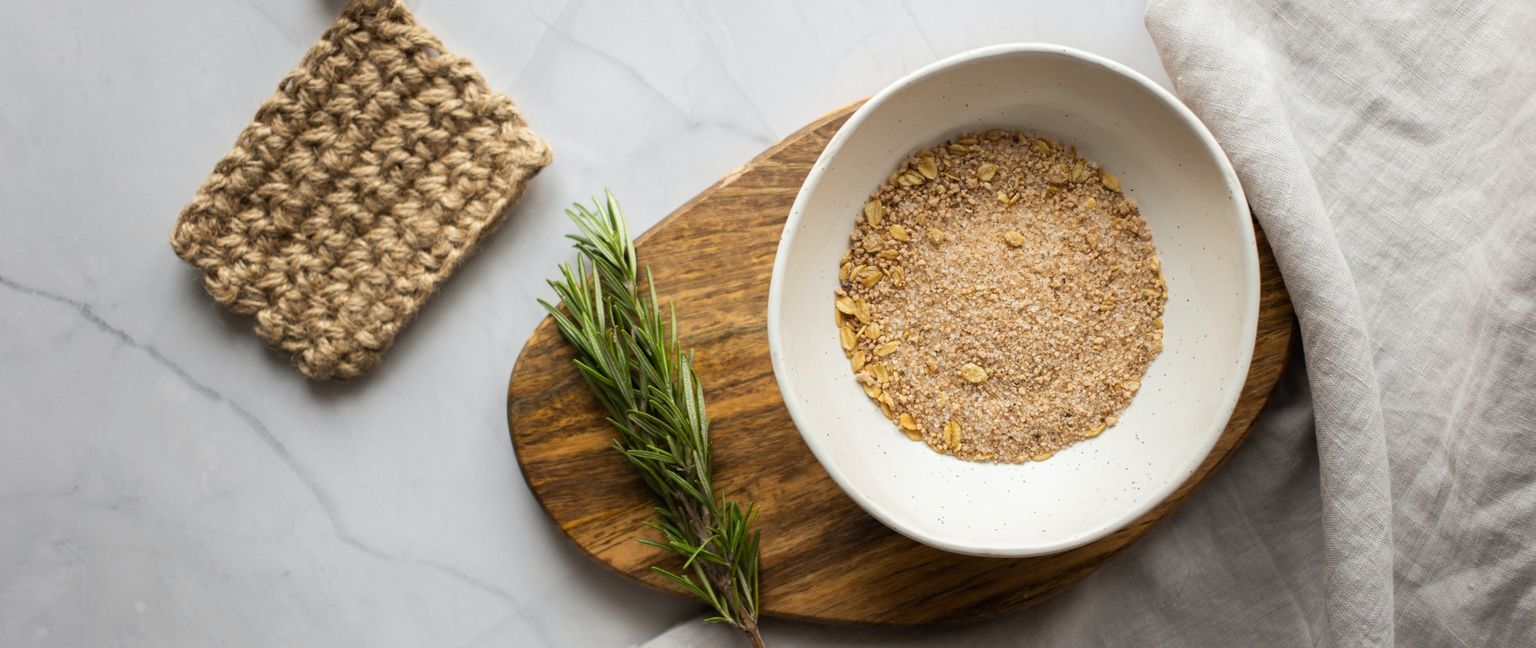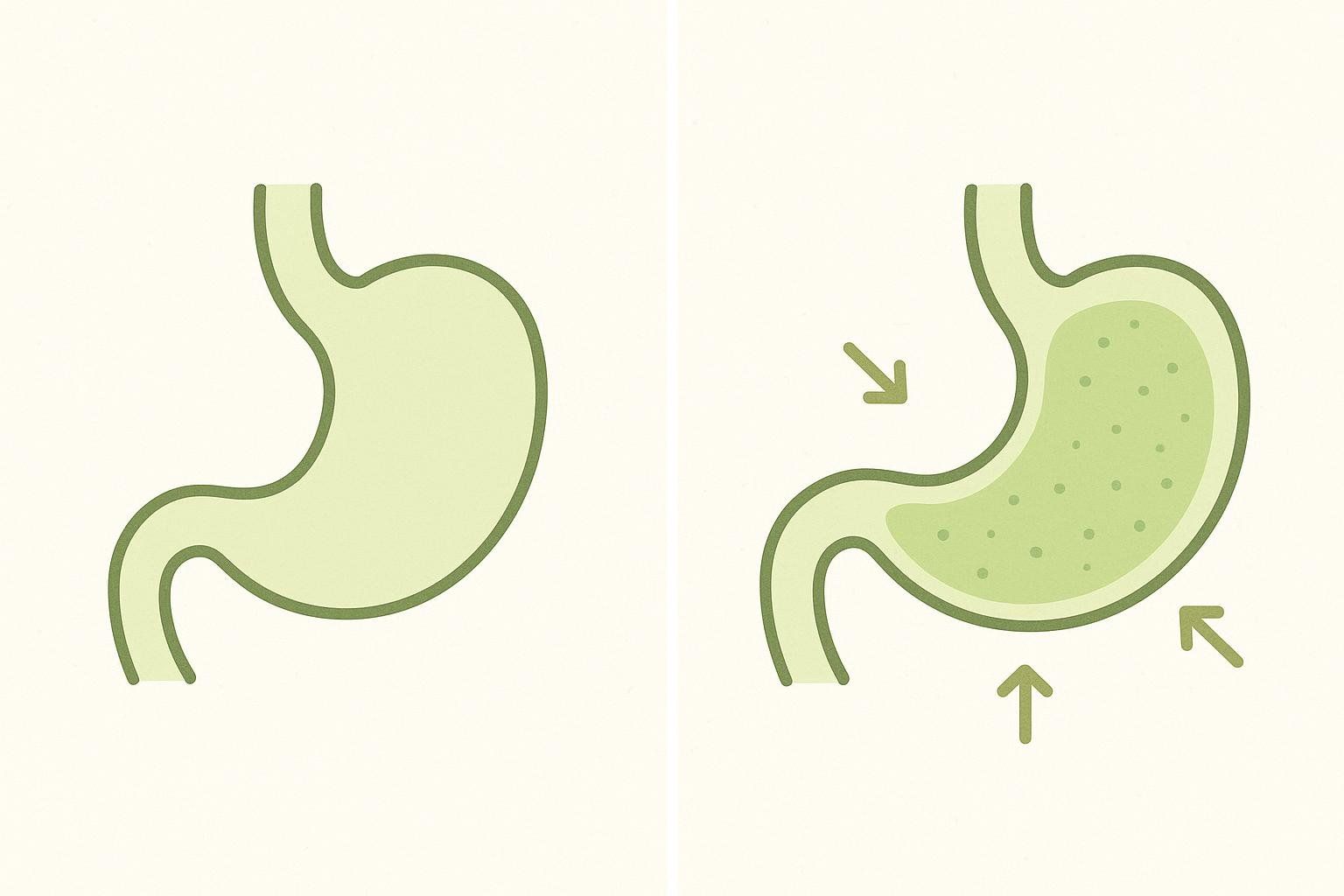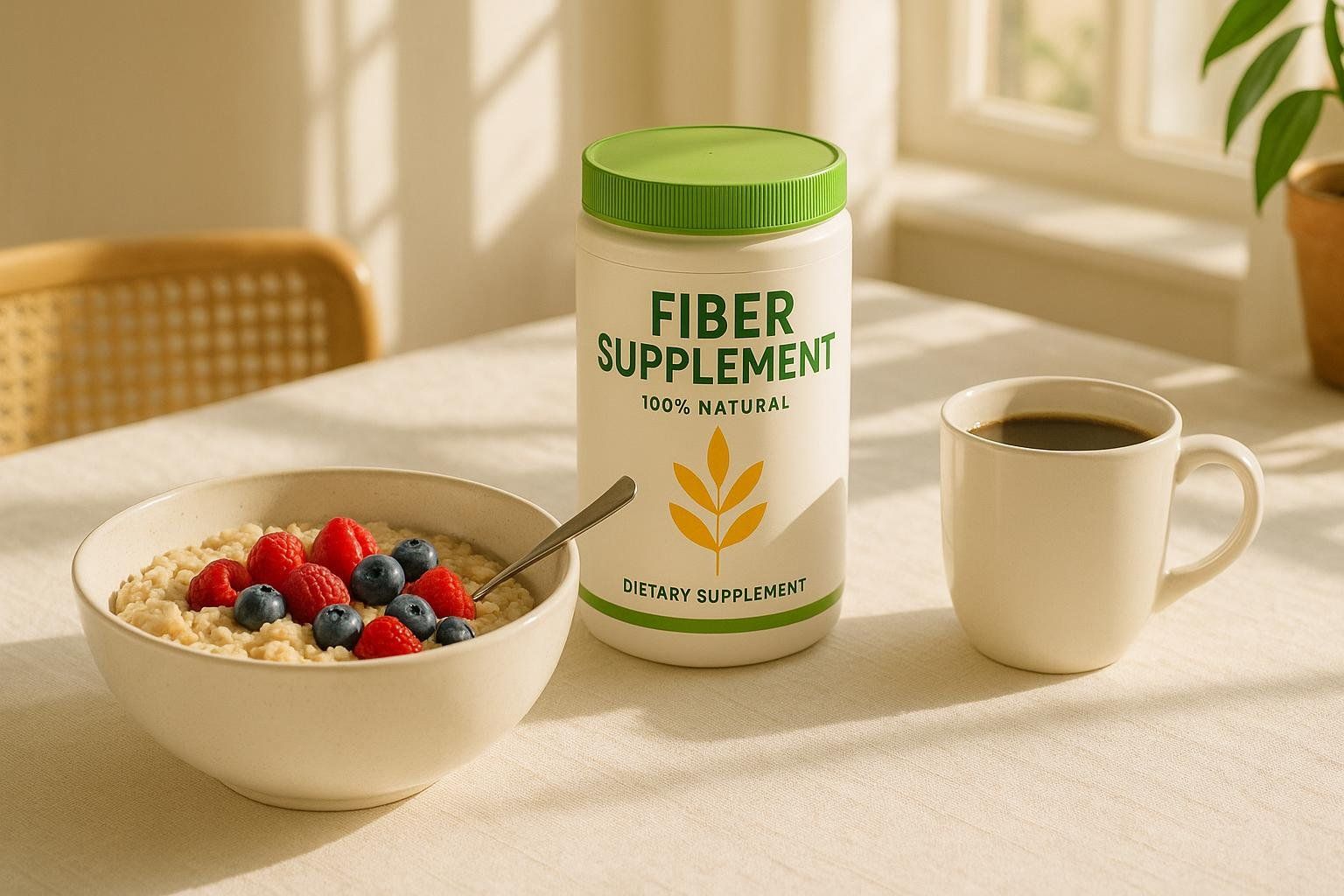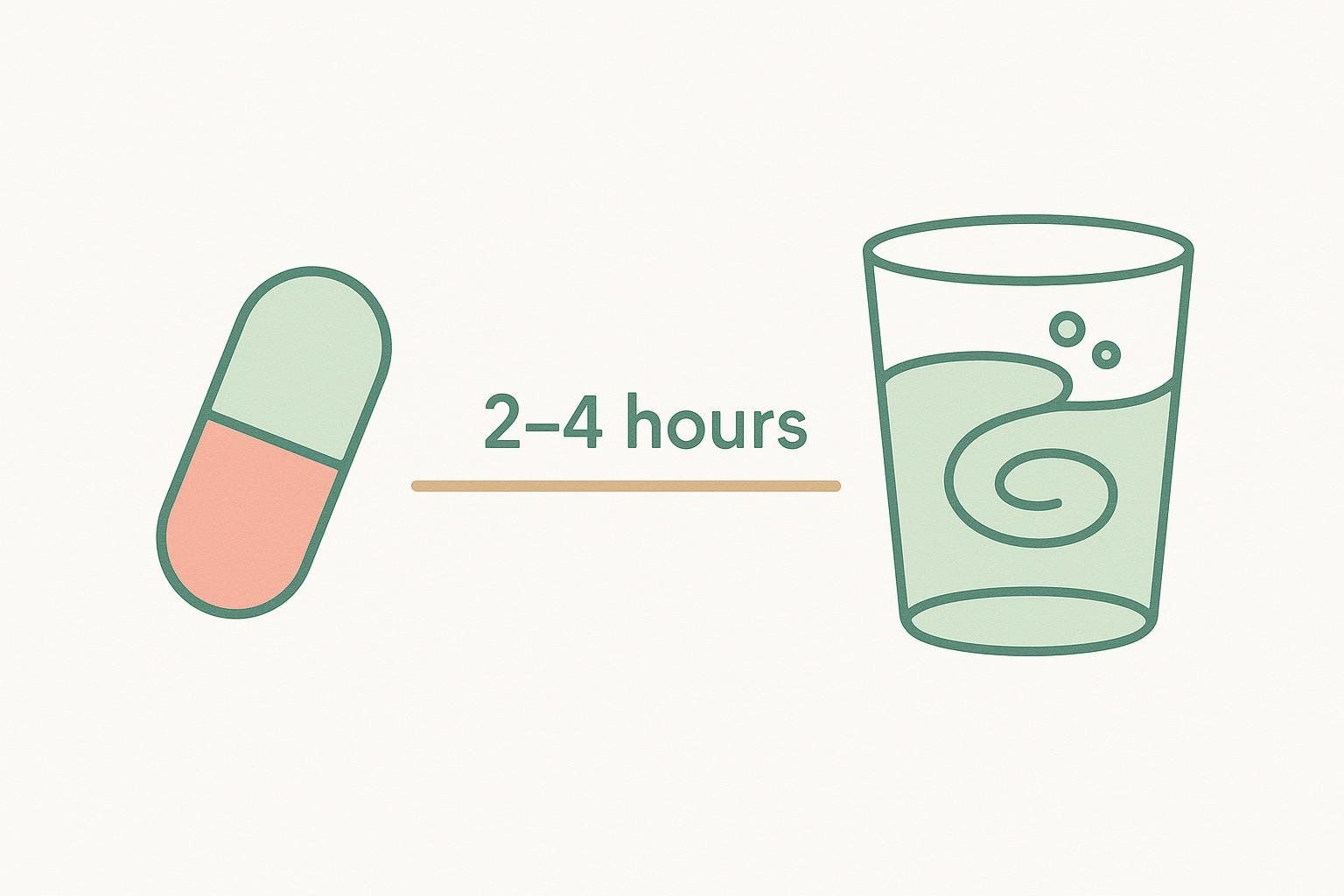Should You Take Fiber Supplements in the Morning or at Night?

The Best Time to Take Fiber Supplements for Weight Loss: A Complete Guide
When you're focused on managing your weight, timing can be everything—especially when it comes to fiber supplements. The optimal time to take fiber supplements for weight loss is 20-30 minutes before your largest meals, which helps maximize feelings of fullness. However, the most critical factor for achieving results is consistency. This guide details the science behind fiber timing and helps you build a routine that supports your weight loss goals.
Understanding Fiber Supplements: The Foundation of Success
Before diving into optimal timing, let's appreciate the important role that fiber plays in our digestive system. Fiber keeps things moving smoothly, like a perfectly choreographed dance routine in your intestines. Without enough fiber, we can find ourselves in a real bind, if you catch my drift!
But wait, there's more! Fiber is not just a one-trick pony. It offers a plethora of health benefits that go beyond just keeping us regular. It can help with weight management, lower cholesterol levels, and even reduce the risk of certain diseases.
Different Types of Fiber Supplements
Fiber supplements come in different shapes and sizes, or rather, different forms and compositions. Understanding these differences is crucial for choosing the right supplement for your weight loss goals:
Soluble fiber supplements, like psyllium husk, dissolve in water and form a gel-like substance. This gel-like consistency helps to soften the stool and ease its passage through the digestive tract. More importantly for weight loss, this gel formation is what creates the satiety benefits we'll discuss.
Insoluble fiber supplements, such as wheat bran, act like little scrub brushes for your intestines. These supplements add bulk to your stool, making it easier for waste to move through your digestive system and preventing constipation.
Additionally, some fiber supplements are made from a combination of soluble and insoluble fibers, providing you with the best of both worlds. However, for weight loss purposes, soluble fibers like psyllium are most effective due to their superior satiety properties.
Why Timing Matters: The Science of Fiber and Appetite Control
Understanding how fiber supplements work for weight loss is crucial to optimizing their timing and effectiveness.
The Satiety Mechanism
Fiber doesn't "burn fat" in the traditional sense. Instead, it works through appetite control—arguably a more sustainable approach to weight management. Clinical research published in Nutrients demonstrates that psyllium fiber significantly reduces hunger and increases feelings of fullness between meals, with greater benefits observed at the higher dosages tested in clinical research.
Here's what happens in your digestive system:

- Physical expansion: Soluble fiber like psyllium absorbs water and swells, creating bulk that activates stretch receptors in your stomach.
- Slowed gastric emptying: The gel-like substance formed by fiber slows the movement of food from your stomach to your small intestine.
- Hormonal signaling: Fiber stimulates the release of satiety hormones including GLP-1, PYY, and CCK, which signal fullness to your brain.
- Blood sugar stabilization: By slowing nutrient absorption, fiber prevents rapid blood sugar spikes that can trigger hunger and cravings.
Think of fiber as a natural appetite regulator—it enhances your body's own fullness signals, helping you feel satisfied with appropriate portions and making it easier to align with your calorie goals.
Evidence from Weight Loss Studies
A comprehensive 2023 meta-analysis analyzing six clinical studies involving 354 overweight and obese participants found significant benefits from psyllium supplementation:
- Weight loss: 4.6 pounds (2.1 kg) greater than placebo groups
- BMI reduction: -0.8 kg/m² decrease
- Waist circumference: -2.2 cm (nearly an inch) reduction
Importantly, these studies used dosages of approximately 10-11 grams daily with most participants taking fiber before meals for maximum appetite control benefit.
Optimal Timing for Different Weight Loss Goals

While pre-meal timing is generally most effective for weight loss, your specific goals and lifestyle may influence the best approach.
Pre-Meal Timing for Maximum Appetite Control
Take fiber supplements 20-30 minutes before your largest meals for the most effective appetite suppression. This timing allows the fiber to:
- Absorb water and begin expanding before food arrives
- Create a foundation of fullness that naturally reduces meal size
- Slow the eating process, giving satiety signals time to register
Health experts at publications like EatingWell also recommend this pre-meal timing as particularly effective for viscous fibers like psyllium, which form the gel-like consistency that promotes satiety.
Pro tip: Target your two largest meals of the day rather than trying to take fiber before every meal. For most people, this means lunch and dinner.
Morning Routine for All-Day Appetite Management

Taking fiber supplements in the morning can provide several weight loss advantages:
Sustained satiety: Morning fiber intake promotes feelings of fullness throughout the day, potentially reducing mid-morning and afternoon snacking.
Blood sugar stability: Fiber helps moderate blood sugar spikes after breakfast, preventing energy crashes that often lead to cravings.
Compliance advantage: You're more likely to remember your supplement when it's part of your consistent morning routine, and consistency is crucial for seeing results.
Digestive benefits: Morning fiber intake supports regularity throughout the day, which can contribute to reduced bloating and a flatter appearance.
Evening Timing to Control Dinner and Snacking

If dinner is your biggest challenge meal, taking fiber 20-30 minutes before your evening meal can be particularly effective:
- Portion control: Helps you feel satisfied with smaller dinner portions
- Late-night snacking prevention: Extended fullness can reduce evening grazing
- Social eating support: Useful when dining out or at social gatherings where larger portions are common
Caution: Some people experience increased gas, bloating, or bowel movements with evening fiber intake. Test your response during a weekend before implementing this timing on work days.
Special Considerations for Different Lifestyles
For Busy Professionals
If your schedule is unpredictable, consistency trumps perfect timing. Consider these approaches:
Set phone reminders: Schedule notifications for 30 minutes before your typical lunch and dinner times.
Keep travel packets: Store fiber supplements at your desk or in your car for consistent access.
Morning routine integration: If meal times vary, morning intake provides baseline benefits.
Remember that taking fiber with plenty of water is essential—insufficient liquid can cause serious choking or bowel obstruction.

For Fitness Enthusiasts
Timing around workouts requires some consideration:
Pre-workout: Avoid taking fiber immediately before exercise to prevent digestive discomfort or unexpected bathroom needs.
Post-workout: Fiber can support blood sugar stabilization during the post-exercise period when your body is restoring glycogen.
Meal timing: If you exercise fasted in the morning, take fiber 20-30 minutes before your post-workout meal to maximize satiety benefits.
Post-Bariatric Patients
If you've had bariatric surgery, fiber timing becomes especially important:
- Start very gradually: Begin with smaller doses than recommended and increase slowly
- Avoid medication interference: Take fiber at least 1 hour before or 2-4 hours after other medications as it can affect absorption
- Monitor tolerance and manage constipation: Post-operative constipation is common, but your reduced stomach capacity requires a very slow introduction of fiber to avoid discomfort or blockages. Monitor your body's response carefully
- Consult your healthcare team: Get specific guidance on timing that works with your post-operative dietary plan
Practical Implementation Guide
Week 1: Establish Your Baseline (Start Slowly)
Start with 3-4 grams of fiber taken 30 minutes before your largest meal. Check your product label to determine the correct serving size for this amount, as this varies between brands. This gradual approach is crucial—when introducing fiber supplements into your routine, start slowly and gradually increase your intake. You don't want to go from zero to hero in the fiber department and end up with digestive discomfort. Take your time and let your body adjust to the newfound fiber regimen.
Critical preparation steps:
- Measure the appropriate serving of fiber supplement into an empty glass
- Add 8-12 ounces of cool water
- Stir immediately and drink within 30 seconds (the mixture thickens quickly)
- Follow with an additional glass of water
- Set a timer for 30 minutes, then eat your meal normally
Week 2: Add Consistency
Increase to two servings daily: one before lunch and one before dinner (or two before your largest meals if that timing works better for your schedule).
Track your response:
- Hunger levels between meals
- Portion sizes at target meals
- Any digestive changes
- Energy stability throughout the day
Week 3+: Optimize for Results
If you are tolerating two servings well, you can gradually increase your intake towards the research-backed dose of 10-11 grams daily. Consider adding one more serving and assess your response for another week before increasing further.
Key success factors:
- Hydration: Increase water intake throughout the day
- Timing consistency: Take at the same intervals daily
- Patience: Full appetite control benefits may take 2-3 weeks to develop
- Food quality: Fiber supplements work best alongside a balanced diet, not as a replacement for healthy eating
Medication Timing Considerations
Critical safety note: Fiber can interfere with medication absorption. Take fiber supplements:

- At least 1 hour before other medications, or
- At least 2-4 hours after other medications
This is particularly important for:
- Blood thinners (warfarin)
- Diabetes medications (metformin)
- Thyroid medications
- Antibiotics
- Blood pressure medications
Consulting with a Healthcare Professional
While we've covered the science and practical applications of fiber supplements, it's crucial to remember that everyone's body is unique. If you're unsure about the best approach for your particular digestive system, it never hurts to consult with a healthcare professional.
When to Seek Medical Advice
If you experience severe digestive discomfort or have underlying health conditions that may be affected by fiber supplements, seeking medical advice is key. Your healthcare professional can guide you in finding the most appropriate fiber supplement and help you navigate your fiber-filled journey.
Personalizing Your Fiber Intake
Remember, the key to incorporating fiber supplements into your routine is personalization. Listen to your body, experiment with different timings, and find what works best for you. After all, we're all unique individuals with unique digestive systems.
Tracking Your Progress
Beyond the Scale
While weight loss is your goal, fiber supplements provide multiple benefits worth tracking:
Appetite changes: Notice if you feel satisfied with smaller portions or experience fewer cravings between meals.
Energy stability: Monitor whether you experience fewer energy crashes and more stable energy throughout the day.
Digestive regularity: Improved bowel movements and reduced bloating contribute to feeling lighter and more comfortable.
Waist measurements: Take monthly waist circumference measurements, as research shows significant reductions in this area with consistent fiber supplementation.

Body Composition Insights
For the most accurate picture of your progress, consider BodySpec's DEXA scans which can show changes in body fat percentage, lean muscle mass, and overall body composition over time. This technology reveals whether your weight loss is coming from fat (ideal) or muscle (concerning), allowing you to adjust your approach if needed.
Realistic Expectations and Timeline
What to Expect
Month 1: Gradual appetite reduction and improved meal satisfaction. You may notice feeling full sooner during meals and experiencing fewer snack cravings.
Month 2-3: More consistent portion control and potential weight loss of 1-2 pounds, assuming you're maintaining appropriate calorie intake for your goals.
Month 4-5: Research suggests cumulative benefits continue building, with average participants losing 4.6 pounds over approximately 5 months.
Beyond Weight Loss
Fiber supplementation provides additional health benefits that support long-term success:
Cholesterol management: Clinical studies show significant reductions in both total and LDL cholesterol.
Blood sugar control: Improved insulin sensitivity and glucose management, particularly beneficial for people managing diabetes.
Heart health: Cardiovascular benefits including blood pressure reduction, which supports overall health during weight loss.
Common Mistakes to Avoid
Timing Errors
Taking fiber immediately with food: This reduces the satiety benefit. Allow 20-30 minutes for pre-meal expansion.
Inconsistent timing: Benefits compound with regular use. Sporadic supplementation won't provide meaningful appetite control.
Insufficient water: This is both ineffective and potentially dangerous. Always use adequate liquid.
Dosage Issues
Expecting immediate results: Unlike stimulant-based appetite suppressants, fiber's benefits build gradually over weeks.
Using the wrong type: For weight loss, prioritize viscous soluble fibers like psyllium over insoluble fibers that don't form the gel-like substance needed for satiety.
The Bottom Line
The best time to take fiber supplements for weight loss is 20-30 minutes before your largest meals, allowing the fiber to expand and promote natural appetite control. However, consistency is more important than perfect timing—choose a schedule you can maintain daily.
Fiber supplements offer a gentle, sustainable approach to weight management through appetite regulation rather than metabolism manipulation. Research demonstrates meaningful weight loss benefits, but the effects are gradual and work best as part of a comprehensive health plan.
For best results:
- Start with 3-4 grams before your largest meal
- Gradually increase to 10-11 grams daily across multiple doses
- Maintain consistent timing for at least 2-3 months
- Always use adequate water with each dose
- Consider professional body composition tracking to monitor progress accurately
Remember that fiber is a tool to support your efforts, not a replacement for a healthy lifestyle built on good nutrition, regular movement, and quality sleep for weight loss and recovery. When used strategically with proper timing, fiber supplements can provide valuable appetite support that makes sustainable weight loss more achievable.


